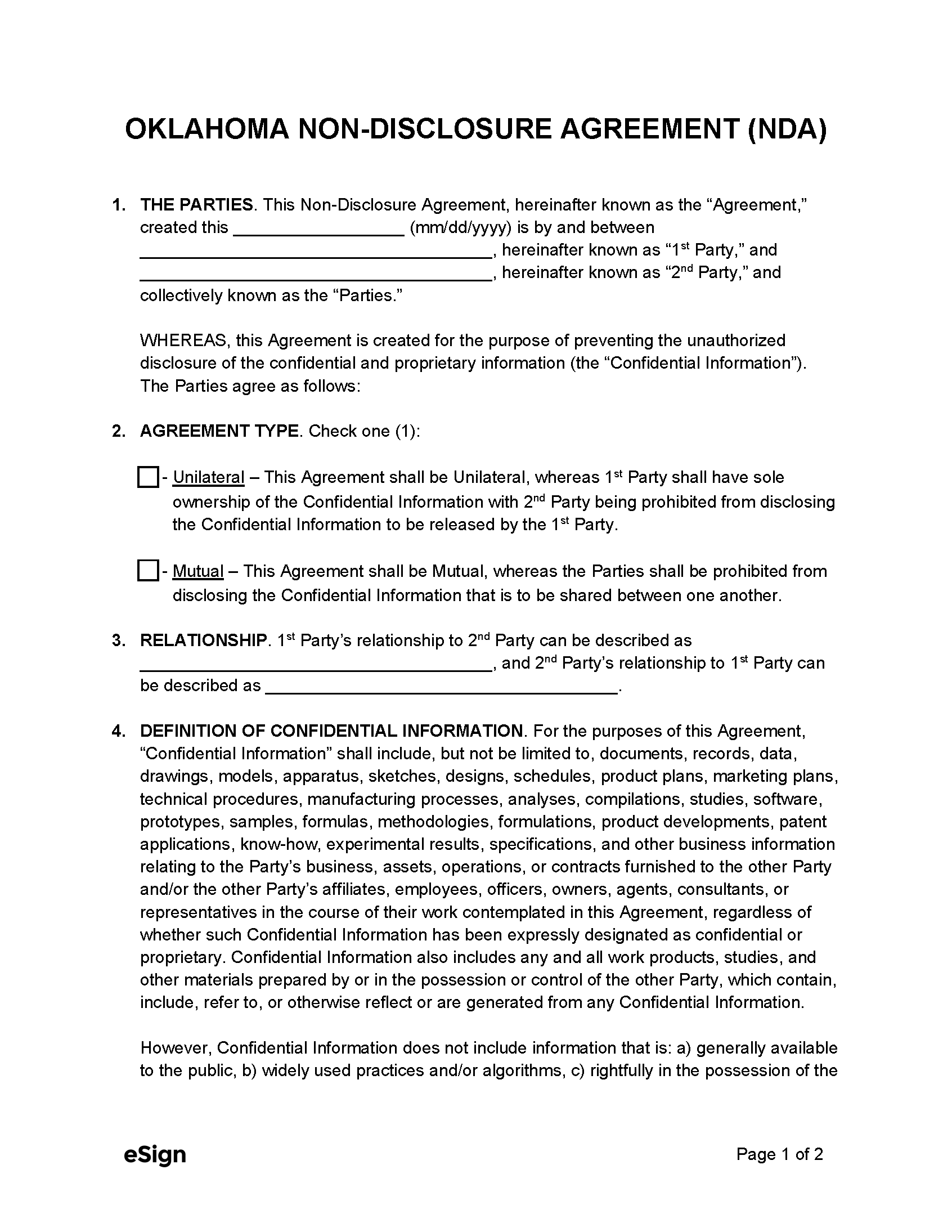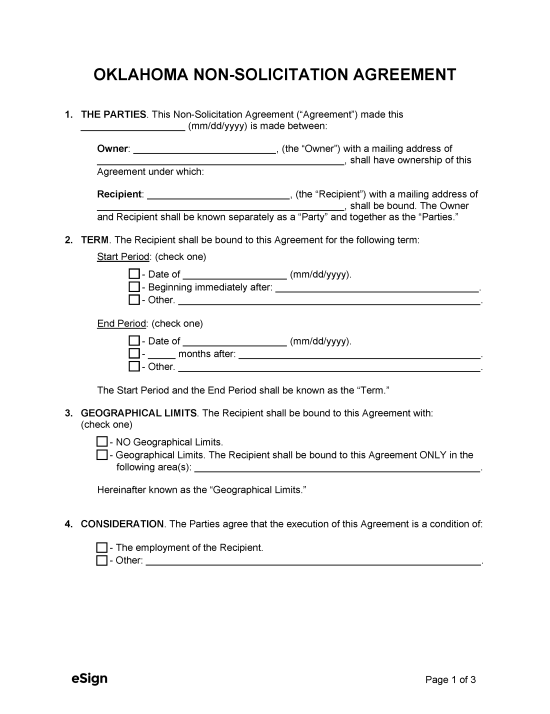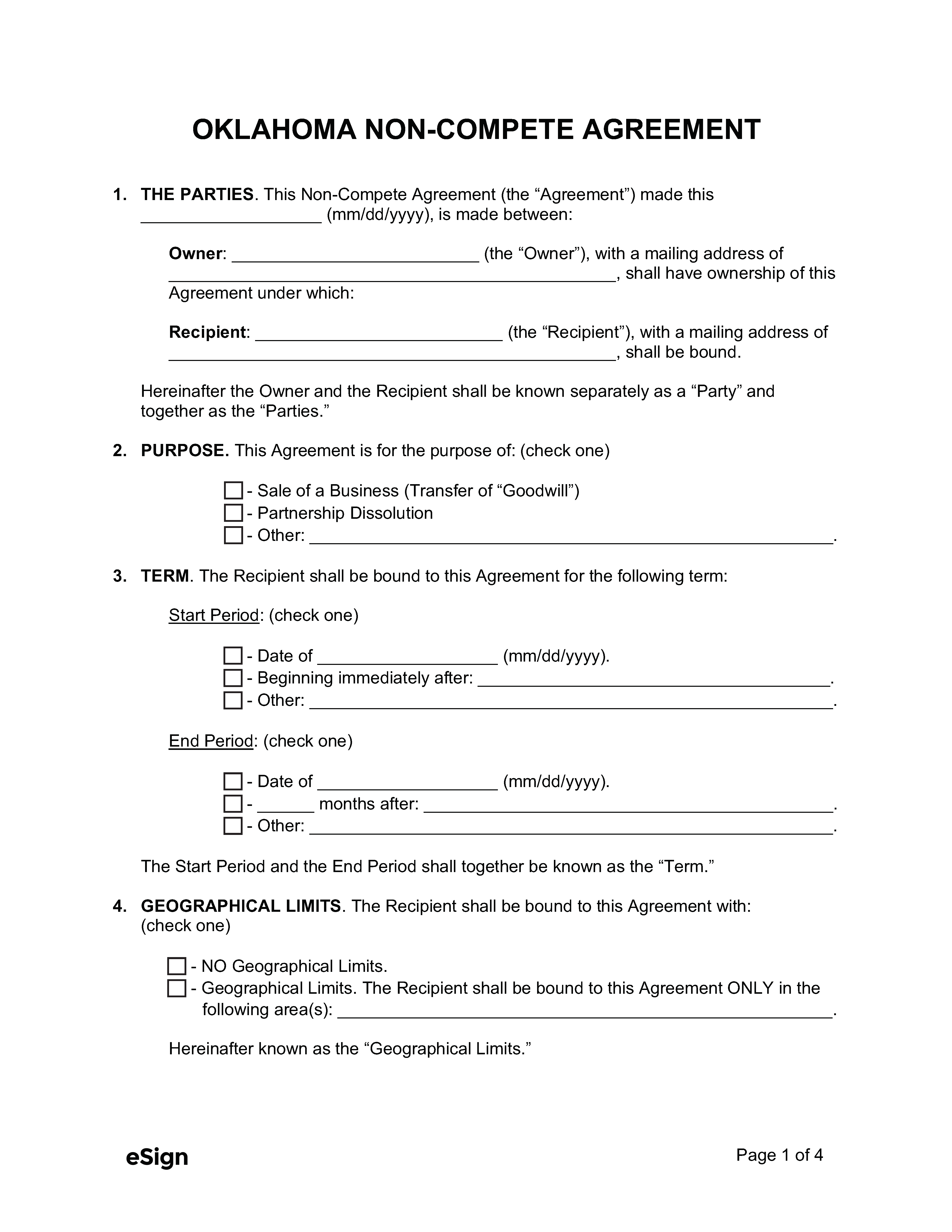Any non-compete agreement that attempts to prevent someone from carrying out their profession is unenforceable in Oklahoma, which means most employee-employer non-compete agreements are void.
Contents |
Enforceability in Oklahoma
In most employment scenarios, non-compete agreements are not enforceable in Oklahoma, as state law prohibits any contract that restricts an employee from carrying out their profession, trade, or business.[1] However, there are a few exceptions wherein an agreement may be enforced. Oklahoma courts will deem a restraint reasonable if it:
1. “Is no greater than is required for the employer’s protection from unfair competition;
2. Does not impose undue hardship on the employee; and,
3. Is not injurious to the public.”[2]
When it IS Enforceable
- Solicitation of customers. A former employee may be restricted from selling goods or services to their former employer’s established customers.[3]
- Sale of the goodwill of a business. An agreement may be made to restrict the seller of a company from establishing or entering a similar business within a specified city, town, or county.[4]
- Dissolution of a partnership. Partners may agree to refrain from carrying out comparable business operations within the same or contiguous county, city, or town when the partnership dissolves.[5]
When it’s NOT Enforceable
- Practicing law. Lawyers may not offer or enter any agreement that restricts their right to practice law when employment is terminated.[6]
Maximum Time Period
No time restrictions are mentioned explicitly in Oklahoma statutes. Oklahoma courts consider each case’s circumstances and facts to determine whether the duration of the non-compete period is reasonable. The court has shown to enforce favor agreements with two (2) year limits or less,[7][8] but tends to find terms of three (3) or more years excessive.[2]
Geographical Area
An NCA signed in the sale of a business or dissolution of a partnership is enforceable if the applicable geographical area is limited to a specified town or city, or to a particular county and bordering counties.[4][5] Oklahoma courts have generally found agreements with too broad of a radius to be unenforceable.
For example, in the case of Cohen Realty, Inc. v. Marinick, the Oklahoma Supreme Court did not uphold an agreement where a real estate broker was prohibited by his former employer from competing within an unlimited geographical area by his former employer.[9]
In the case of Cardiovascular Surgical Specialists, Corp. v. Mammana, the restrictive covenants barred a doctor from working within a twenty-mile radius of their former employer’s offices, effectively creating a 100-mile radius outside of Tulsa. The Oklahoma Supreme Court found these limitations too restrictive.[10]
Consideration
Consideration is what an individual will receive as the value in return for signing a non-compete agreement. For example, the money received in the sale of the goodwill of a business. In Oklahoma, whenever there is a written instrument, consideration will be presumed,[11] meaning that when the agreement is signed, it is assumed both parties have agreed that the value exchanged for the restrictive covenants will be acceptable.
Sources
- Okla. Stat. tit. 15 § 217
- Loewen Group Acq. v. Matthews, 12 P.3d 977, 2000 OK Civ. App. 109 (Okla. Civ. App. 2000)
- Okla. Stat. tit. 15 § 219A
- Okla. Stat. tit. 15 § 218
- Okla. Stat. tit. 15 § 219
- OK ST RPC Rule 5.6
- Tatum v. Colonial Life & Accident Insurance Co. of America, 465 P.2d 448, 1970 OK 27 (Okla. 1970)
- Speech and Hearing Center v. Baughman, 996 P.2d 939, 940-41, 1998 OK Civ. App. 122 (Okla. Civ. App. 1998)
- Cohen Realty, Inc. v. Marinick, 817 P.2d 747, 749, 1991 OK Civ. App. 71 (Okla. Civ. App. 1991)
- Cardiovascular Surgical Specialists, Corp. v. Mammana, 61 P.3d 210, 2002 OK 27 (Okla. 2002)
- Okla. Stat. tit. 15 § 114
- Martin & Fay, Inc. v. Pickard, 780 P.2d 1170-72 OK 122 (Okla. 1989)
Related Forms (2)

Download: PDF, Word (.docx), OpenDocument

Download: PDF, Word (.docx), OpenDocument
